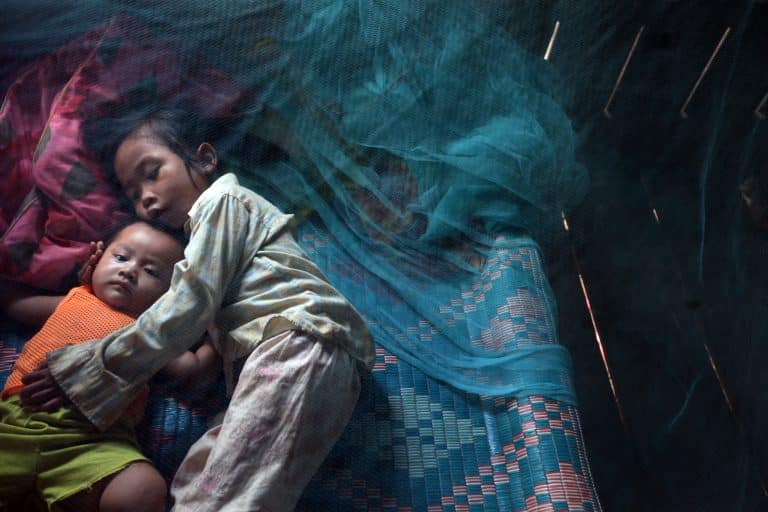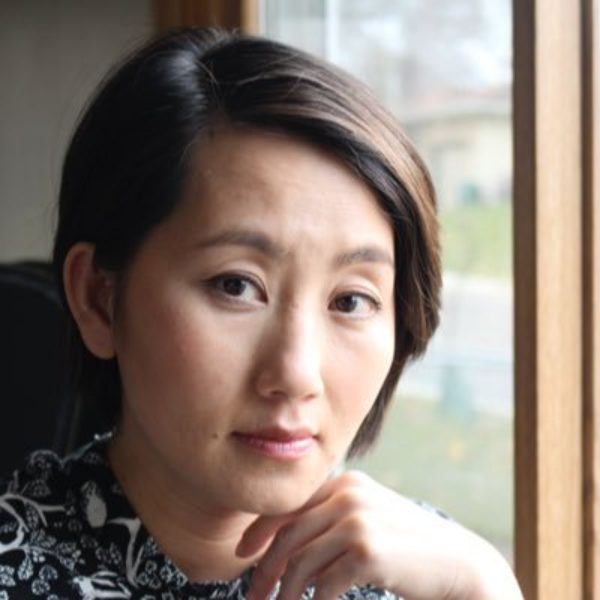
A sister and brother rest under the veil of a mosquito net. Image by Paula Bronstein/Getty Images, © All Rights Reserved.
In a Family, We Raise Each Other
In the home that I grew up in, I was expected to take care of the younger ones. I was born the second oldest in a family of seven children. For nearly the first decade of my life, because my mother had many miscarriages in between me and the young ones, I was the baby of the family. I still have fond memories of my older sister Dawb holding my hand as we crossed the dirt road of our childhood toward the busy streets of America. I can still see the outfits, the faded jeans of the ’80s, the red and white striped T-shirt, and the white socks my mother used to put up on my bed for me each morning, the bowls of steamy ramen with egg she’d prepared for my breakfast. Then, in the blink of an eye, I was the one pulling out clothes for the younger ones, cotton pants with their matching tops, socks, and underwear from the plastic laundry baskets we kept their folded clothes in. I remember having to stand on tiptoes over the pot of bubbling ramen on the stovetop, afraid of the egg dropping into the broth and the bubbles burning me.
Our parents are not educated people. They came into being in a war-torn country, became refugees as young parents, have spent their working lives in America in the hard factories of Minnesota — trying to get us from one day into the next, in the hopes that we would lead more successful, fulfilling lives, at least flourish above the pressures of the poverty line, in some happy future somewhere, with or without them. As they worked, their expectation was that we did the same. The first job was easy enough to understand: get educated, go to school, and work hard, and maybe one day we can choose our jobs and not have them choose us. The second job would prove much harder: The older ones had to take care of the younger ones.
All my life as an older sister, I’ve had to take care of the younger ones. At first, it was finding them food, keeping them clean, and coming up with fun offerings like putting a blanket over me, extending my hands straight in front of me zombie style, and walking after them, moaning and groaning of an insatiable hunger for tender, young flesh. Then, it got harder as they grew up and wandered further and wanted more things — different tastes on their tongues beyond my repertoire of fried eggs, burnt stir-fry, and ramen in the kitchen. When they learned how to take care of their bodies in the fashion they saw fit, they had new ideas about what they wanted to dress those bodies in, beyond the matching outfits from the days of our youth when a get-up from K-mart cost $10. They learned about stores like GAP and Macy’s. They learned that movies didn’t just play on television; there were such places as Carmike and AMC. They learned about new movies, new songs, and discovered new role models. They learned of a world beyond what I could safely offer as their older sister — even as our older sister Dawb took on more and more of the outside responsibilities like scheduling doctors and dentist appointments, so that I could focus on the work inside our tiny home when Mom and Dad were not around.
Saying “no” from a place of love is hard — especially if you’re not a parent but you have some of the responsibilities of a parent, and their wide open eyes look to you for guidance, for strength, for that band aid against the hard ground. Saying “no” is hard because it means those eyes narrow on you, it means they grow skeptical of your powers, shrug you off, and sometimes they fall and they bleed alone because they are too far for your reach, beyond the scope of your influence and care, your knowledge of the world. It was hard because always, even after they made moves to push away, I continued holding on.
One of the most humbling and precious experiences of my life has been taking care of my younger siblings. When I look at Xue, I don’t see him as he is now, a young man still confused, looking for life and love, a big watch on his wrist, a big chain on his neck. I see a little boy holding a bottle of grasshoppers looking up at me, his own eyes bright with happiness and joy, happily loved. When I look at Hlub I don’t see her as she is now, a young woman with sad eyes and white teeth; I see a little girl with teeth too big for her mouth, her bangs cut straight across her face, her eyes so brown and bottomless I could drown in their dreamy depths. When I look at Shell I don’t see her as she is now, a shower of black hair falling heavily around her shoulders, head cocked to the side, face tired, continually questioning, critiquing, passionately engaging with a bigger discourse. I see a little girl standing in a summer dress, shoe-less, in a gray photograph, her mouth folded in a gentle smile, unafraid of the poverty around her, standing in hope and endless possibilities. When I see Taye, I don’t see the bigness that is her now, her head and her heart exploding in collision and care, a solid figure against all the ills of a bigger world, a sound defender of justice and equity, of race and diversity, this fount of feminism and fervor. I see instead, a little baby crawling along the floor, looking for paint chips, sucking at wet fingers, her hair connecting between her eyes in a soft V. Max, sweet Max, who came so long after all of us, who is still now just beginning to respond to the wonder of a world beyond us, still within my reach, reaching for me. Long before I became a parent, even as I have become a parent, helping my mother and father and Dawb, my older sister, raise my younger siblings has been one of the most important tasks of my life.
It is a job that is long from finished, I hope. I hope that I get to see them beyond their first broken hearts, that I get to see them when those hearts are mended and stronger than ever. I hope that I get to see them beyond their first real jobs, fully embarked on the work of their lifetimes. I hope I get to see them in the glory of their brightest days — still to come. I’m a dreamer, but I dream of the possible things, so I do not hope for a dream of a life in which I’m no longer taking care of them — even as they have shown me, again and again, that as I take care of them, they have taken care of each other, and me.
My journey as a big sister has taught me more about life’s possibilities and the different pathways that people can take into the road of tomorrow than any other thing I’ve been part of. While we do not live each other’s lives, my work as a big sister, my identity as their big sister has me feeling so very keenly their triumphs and tragedies.
In the home that I will die in, I hope to be surrounded by them, the younger ones I’ve cared for, and to feel the strength of their lives pulsing like a heartbeat…continuing long after mine has ceased. I hope to die knowing that they will be fine without me, without us, their elder siblings, their parents, their caretakers, that they have learned the important lessons of caring for those who are still coming along well and lived it deep.
